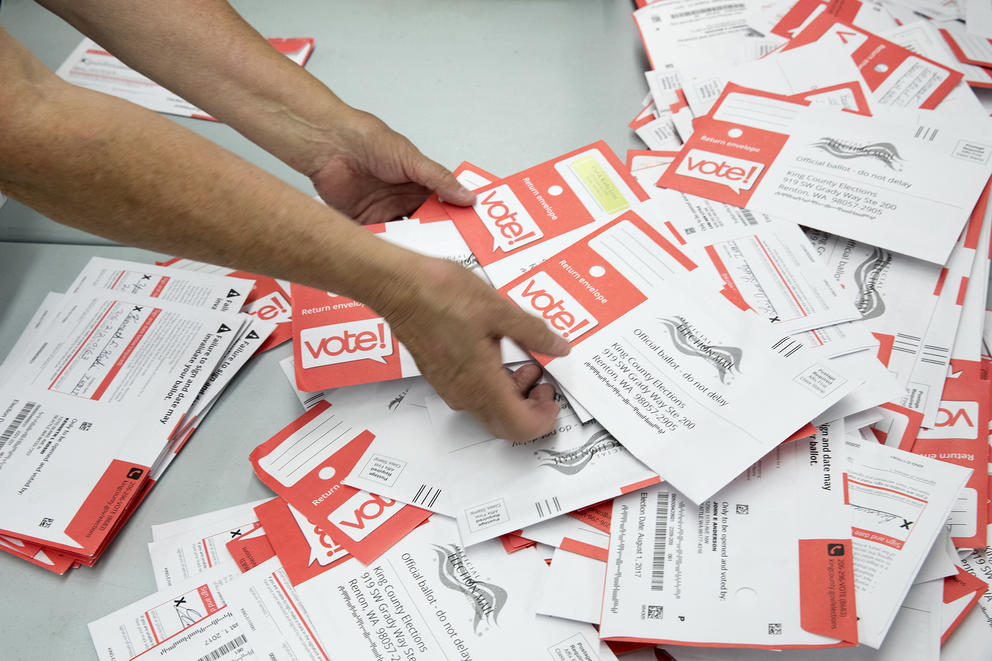That valuable system, which helped the Secretary of State’s Office update more than 175,000 Washington voter records last year, is about to have its legs cut off.
Election deniers are dragging the low-key and low-profile work into the morass of attacks on voting systems and election integrity after former President Donald Trump – who has repeated false claims that he won the 2020 election – lashed out against the system.
Top election officials in Missouri, Florida and West Virginia earlier this month announced they would no longer work with the program, according to The Associated Press. Alabama previously announced it would leave the system, and Louisiana pulled out last year.
Now, Washington Secretary of State Steve Hobbs and others are worried that their job keeping voter lists up-to-date and avoiding fraud will become harder if more states refuse to share and analyze voter rolls that could weed out people who have died, or may be voting multiple times in different states.
“It shows you how much pull and influence [Trump] has on that wing of the Republican Party, that asserts an enormous amount of pressure on Republican secretaries of state,” said Hobbs, of Trump. He added: “But there are some Republicans who are still solid with ERIC.”
A moderate elected last year as secretary of state, who among other things oversees Washington’s election system, Hobbs said he and other Democrats are reaching out to their conservative counterparts to try to clear up questions or concerns.
“The system works when more states are on board,” Hobbs said. “What we don’t understand is, if you’re trying to combat fraud, this is the best system for it … and I think these states are going to quickly realize how expensive it is and near-impossible it is to do their own thing.”
ERIC’s singular mission is helping states improve the accuracy of voter rolls and increase access to voter registration, according to its website. The organization is overseen by the states that choose to join it. Washington was a founding member when it formed in 2012 with help from The Pew Charitable Trusts. Republican Kim Wyman, who was elected in 2012 as Washington Secretary of State, was one of a handful of people involved in ERIC’s founding. The other founding states were Utah, Nevada, Colorado, Delaware, Maryland and Virginia.
“ERIC is never connected to any state’s voter registration system,” executive director Shane Hamlin said in a statement after conspiracy theories began popping up. “Members retain complete control over their voter rolls and they use the reports we provide in ways that comply with federal and state laws.”
“We follow widely accepted security protocols for handling the data we utilize to create the reports,” he added. “Our servers are housed in a managed, secure data center located here in the U.S. Secure remote access to the data center is limited to only employees who need it to perform their duties.”
King County Elections Director Julie Wise shares some of Hobbs’ concerns. Wise called the program a useful tool that allows election workers to verify voter rolls. It also alerts them when a new person moves to Washington who’s eligible to vote but isn’t registered.
"I think ERIC is critically important,” said Wise. She called the move against ERIC a "baseless attack."
Last year, Washington state was alerted to 9,000 people eligible to vote but not registered, according to Hobbs: “Trying to encourage them to register is a good thing.”
With more conservative states threatening to pull out of ERIC, Hobbs is now waiting to see what will happen next.
“It’s so hard to get my arms around this misinformation that is being believed by very educated elected officials in these states,” he said. “And I’m hoping that they will come around and will look at the costs of doing their own system and look at the benefits of … cleaning up duplicate voters, to go after the fraud they claim to say is happening. This goes after that.”


